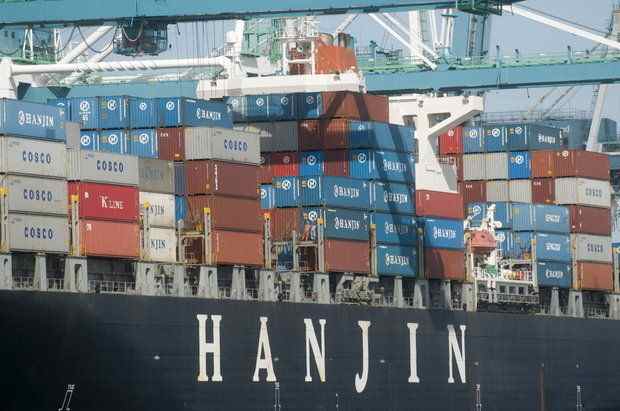forum
library
tutorial
contact

Port Extends Ocean Carrier Subsidies
by Mateusz PerkowskiCapital Press, December 10, 2014
|
the film forum library tutorial contact |

|
Port Extends Ocean Carrier Subsidiesby Mateusz PerkowskiCapital Press, December 10, 2014 |
The Port of Portland will continue paying subsidies to ocean carriers so they
don't abandon its container terminal facility, which agricultural exporters rely on.
 The Port of Portland is extending subsidies paid to ocean carriers to convince them to continue shipping cargo to and from its container terminal facility.
The Port of Portland is extending subsidies paid to ocean carriers to convince them to continue shipping cargo to and from its container terminal facility.
Agricultural exporters in Oregon hope to keep the container terminal open, because otherwise they would have to ship farm goods at greater expense through the more distant ports of Seattle and Tacoma.
The port commission voted on Dec. 10 to pay up to $4 million in subsidies to Hanjin and other carriers, which are at risk of avoiding the facility due to slow container movements.
The subsidies were approved over the objections of the longshoremen's union, which is engaged in a dispute with the contractor that operates the terminal, ICTSI Oregon. The company accuses the union of staging slowdowns that threaten its relationship with carriers.
According to International Longshore and Warehouse Union, the subsidies are rendered moot by the increased rates that ICTSI is charging ocean carriers.
"We think your efforts are futile," said Mike Stanton, president of the ILWU Local 8 in Portland.
Movements of containers on and off ships have dropped from about 26 per hour in 2010, when ICTSI signed its contract with the port, to about 13 per hour now, said Greg Borossay, senior manager of trade and cargo development for the port.
The reduced productivity convinced the port to begin paying per-container subsidies to ocean carriers, which see slowdowns as unacceptable due to tight loading schedules in Asian ports, he said.
"We know they are losing patience," he said.
Hanjin, which handles 78 percent of containers at the port, threatened to stop servicing the facility in 2013 but changed its mind earlier this year after the port increased subsidies from $10 per container to $20 per container.
Global shipping is in a time of turmoil and shippers are providing the Port of Portland with a niche service, considering it handles fewer containers than major West Coast ports and cannot support the massive new ships that carriers are building, Borossay said.
"Nothwithstanding all these issues, we haven't lost service since the program has been in place," he said. "We haven't gained any, but we haven't lost any either."
At his urging, the port's commission agreed to extend the subsidies through 2015 at a rate of $25 per container, with the possibility of an incentive payment of up to $25 per container if they increase volumes.
Mike Stanton of ILWU said the subsidies are a waste of resources because ICTSI recently began charging carriers $120 more per container.
"We don't have a competitive market here," he said. "ICTSI has a monopoly on this market."
The lower productivity at the container terminal is also the fault of the company, which has been disregarding safety, said David Strader, president of the ILWU's Local 40, which represents supercargoes and clerks.
Longshoremen risk their lives running heavy machinery, so the productivity issue should be resolved through safety improvements rather than the subsidy, he said. "It doesn't address the problem."
learn more on topics covered in the film
see the video
read the script
learn the songs
discussion forum
